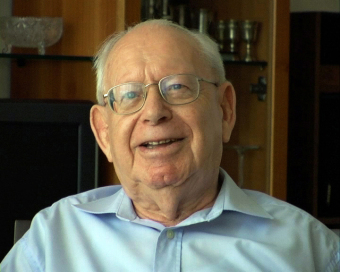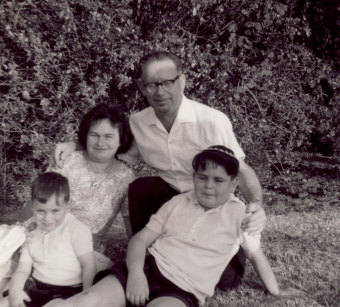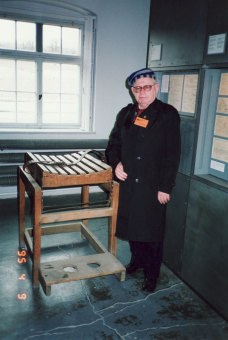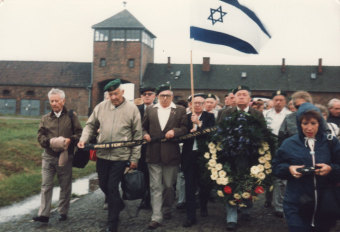Ya’acov Silberstein (*1924)

© Fritz Bauer Institute
“I tell the students who are going to deal with the material, not only with mine but that of everybody who was in Buna-I.G. Farben, ‘Look what we went through. Learn, and don’t let this be forgotten.’”
“I said, ‘I have to see the end of the Nazis.’ That gave me a lot of energy. I said, ‘I have to see the end, period. I have to see the end, that and live, too.’”[1]
Ya’acov Silberstein was born in Tomaszów-Mazowiecki near Łódź, Poland, in October 1924, in a family of strictly observant Jews. He had only one sister, who died before he was born. His parents owned a clothing store in the center of Tomaszów, but it was run primarily by his mother, as his father, adhering to tradition, was usually in the synagogue praying and studying the religious writings and commandments. Ya’acov’s father was a Gerrer Hasid, a distant relative of the Rabbi of Gur (or Ger), the head of the Gerrer Hasidic dynasty. Ya’acov studied in religious schools since childhood, planning to become a rabbi himself. At the age of 11, he entered the yeshiva, first as a pupil of the Lubavicher Hasidim; then, at the age of 12, he entered the Chachmei Lublin Yeshiva, at that time the largest Jewish religious school in Poland.
Ya’acov Silberstein was arrested in Tomaszów on September 13, 1939, after he had come home for the High Holy Days. He spent several weeks in prisons in Częstochowa, Görlitz, and Rawicz, until the SS took him and other Polish Jews to the Buchenwald concentration camp. There he worked first in the quarry, and later in the bricklayers’ school. In October 1942, Ya’acov Silberstein was one of the first prisoners to be deported from “Imperial German” (reichsdeutsche) camps to the Buna/Monowitz concentration camp, to build the camp and plant for I.G. Farben. He was active in the resistance movement in Buna/Monowitz, but was betrayed by a Kapo to the SS and tortured. He did not betray his comrades, however. On January 18, 1945, the SS forced the prisoners to take part in the death march to Gleiwitz; from there, Ya’acov Silberstein was transported to Buchenwald. After two weeks in Buchenwald, he was sent to an armaments plant in Altenburg for forced labor, and there he was liberated by the U.S. Army in April 1945. Ya’acov Silberstein’s parents and all his aunts, uncles, and their families were murdered in Treblinka by the Germans in October 1942.
Ya’acov Silberstein, passing through Prague, went to Italy, where he worked for the Aliyah Bet, which organized illegal immigration to the British Mandate of Palestine. He also tracked down SS men. He made an attempt to immigrate illegally, but was caught by the British and detained in Cyprus for a year. In June 1947, he was allowed to immigrate, with Rachel Moses, whom he had married in Cyprus. The couple settled in Rishon Le-Zion and had two sons, whom they raised to be religiously observant.
In 1953 Ya’acov Silberstein founded the Centre of Organizations of Holocaust Survivors in Israel (מרכז האירגונים של ניצולי השואה בישראל), to which 42 organizations of survivors belong. In 1994 he established the Foundation for the Benefit of Holocaust Victims in Israel (הקרן לרווחה לנפגעי השואה בישראל), for which he continues to work today. This charitable organization helps provide medical care for needy survivors of the Holocaust. Today Ya’acov Silberstein lives in Rishon Le-Zion, Israel.
(MN; transl. KL)
Ya’acov Silberstein, visual history interview
(Hebrew, with German subtitles)





















